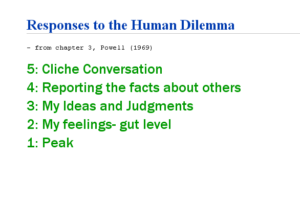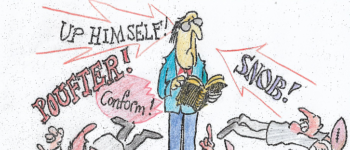1972: The Scatter Hypothesis
July 3, 2019
By AHNZ
The Scatter Hypothesis was minted by Austin Mitchell to explain what he observed about New Zealanders…
‘Historically, New Zealand social groups have been scattered. Separated by, say, several acres between homes. Their acquaintance wide and shallow, not deep. Their skill is in being pleasant and concealing what little diversity they may have. Killing any intimacy before it grows. Big Neighbour is always watching you. Keep him happy. Conform. Nothing to fear as long as you behave,’
‘In mass societies like gather together, developing their own life styles,uniforms, newspapers and magazines, languages. New Zealand is a small society, scattered out. Not big enough to form class divisions. Hence, the imperative of ‘getting on with people’ and not being ‘up yourself’ or a ‘try hard’- Paraphrasing Austin Mitchell (1972)¹
I think Mitchell’s Scatter Hypothesis implies three things.
One, that such a society as this is a Slave Culture. That is, a society made up to horizontally police itself making it affordable, thus possible, for a political class to rule.
 The second implication is that such a society will primarily discourse in the outer levels of passionless conversation. These are, Cliche Conversation and Reporting the facts about others.²
The second implication is that such a society will primarily discourse in the outer levels of passionless conversation. These are, Cliche Conversation and Reporting the facts about others.²
Thirdly, it will mean this society is a cultural colony of others (USA, Britain) rather than its own self. And that’s how it is here.
Comment: “Ugh, very true and very much a thing when you grow up in the provinces. People who live this inauthentic, substance-free life really don’t like those who rise above it.”
They don’t. Because it’s a call to action: You can be an individual too, not yet another Muggle.
People who disown their own authenticity are hostile towards anyone who is trying to embrace it. Those others are a living provocation, a triggering example, to irritate the person who is invested in not standing upright. Likewise, there’s nothing so annoying as conspicuously happy people when you’re trying to be depressed and miserable!
Not I, some child, born in a marvelous year,
Will learn the trick of standing upright here.
– Curnow
 There can be no doubt these things are true about New Zealand in general as explored and revisited in, say in ‘The Passionless People’, McLauchlan (1976). If your brain’s idling speed regulates higher than cliche conversation involving sports or weather you’re going to be an odd one out and probably alone. But is that geography’s fault?
There can be no doubt these things are true about New Zealand in general as explored and revisited in, say in ‘The Passionless People’, McLauchlan (1976). If your brain’s idling speed regulates higher than cliche conversation involving sports or weather you’re going to be an odd one out and probably alone. But is that geography’s fault?
I think there are other supporting reasons than Scatter Hypothesis too though, such as inherited “anguished, self-flagellation of Celtic puritanism” as McLauchlan wrote. But I’ll file this one away as a causal factor.
—
Image ref. Les Gibbard cartoon from Mitchell’s book with some colouring in liberty taken by me
1 p22, The Half-Gallon Quarter-Acre Pavlova Paradise
2 Ref. The 5 main levels of human interaction; Powell (1969)
 Like Comment Share
Like Comment Share





